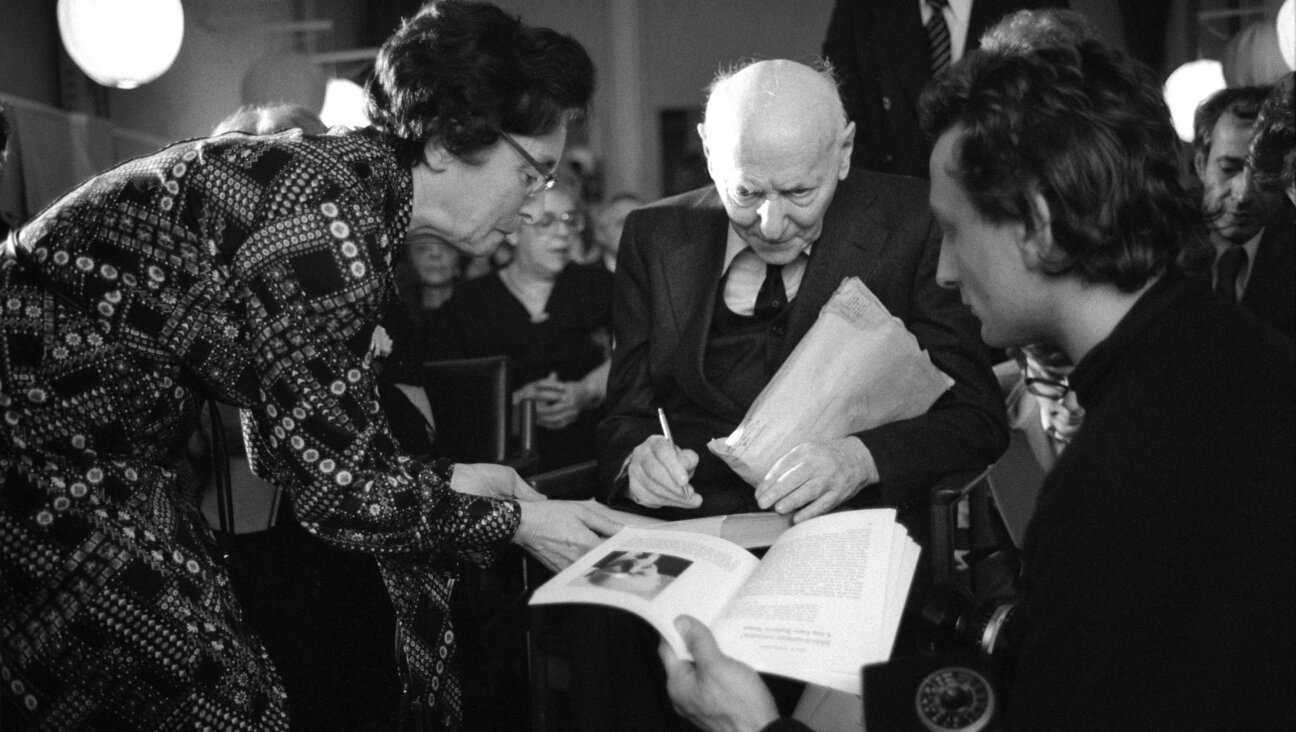Freshmen Lead Record-Breaking Dem Fundraising
As the GOP mounts its campaign to recapture seats in Congress in 2008, the unusually large class of first-term Jewish Democrats is showing fundraising mettle in swing districts likely to be top Republican targets.
Rep. Ron Klein, a lawmaker from Florida’s 22nd congressional district, raised nearly $1.3 million in the first half of 2007, the second highest total posted among the 42 Democratic freshmen, and nearly as much as was raised by House Speaker Nancy Pelosi. In Arizona, Rep. Gabrielle Giffords brought in more than $900,000, posting the fifth highest total among the party’s first-year class.
“Knowing that we’re going to have another potentially close one, I wanted to start early,” said Klein, whose district includes parts of Broward and Palm Beach counties, in an interview with the Forward. “This was a Republican seat for 26 years. I assume the Republican Party’s not giving up on it so easily.”
These aggressive fundraising starts are, in fact, reflecting the record-breaking success that Democrats are enjoying nationwide. Including candidates for the White House and Congress, along with the Democratic National Committee and other party committees, the party has raised a total of $388.8 million, outpacing the GOP by more than $100 million so far in the 2008 campaign. If the trend holds, it will be the first time in 30 years that Democrats have outspent Republicans in federal elections.
The stakes are particularly high for the Democrats’ freshman class, which captured 30 Republican House seats in 2006. The party is hoping not to repeat the GOP’s performance in 1996, when, just two years after its 1994 electoral revolution, 12 out of 73 Republican freshmen failed to win re-election.
Although the protracted Iraq War continues to ravage President Bush’s approval rating — which currently hovers at 33%, according to a nationwide Washington Post-ABC News poll conducted last week — the survey showed that Congress, with a 37% approval rating, is not faring much better.
In addition to Klein and Giffords, several other Jewish freshmen in competitive districts have made fundraising a top priority. Kentucky’s first Jewish member of Congress, Rep. John Yarmuth of District 3, raised $600,000 in the first half of 2007, while Rep. Paul Hodes, in New Hampshire’s 2nd district, brought in $570,000. Rep. Steve Kagen, a physician who captured Wisconsin’s eighth congressional district seat in the most expensive House race in state history, raised $422,000.
All five are members of the Democratic Congressional Campaign Committee’s Frontline program, which assists incumbents projected to be vulnerable. The program is headed by another Jewish representative, Debbie Wasserman Schultz of Florida.
Klein, who narrowly defeated 26-year Republican incumbent Rep. E. Clay Shaw, Jr. in 2006, already faces two declared Republican opponents: Allen West, who is a retired U.S. Army lieutenant colonel, and former Navy pilot Marc Flagg. While Shaw has not officially entered the 2008 race, he and Klein have already exchanged heavy-hitting mailers, with Shaw attacking Klein for accepting campaign money from the sugar industry —“Big Sugar is pumping big pollution into the Everglades… and pumping big campaign contributions to politician Ron Klein” — and Klein attacking Shaw as a “Bushaw” who follows “wherever George Bush goes.”
With little time to prove themselves in Congress before running for re-election, the Democratic freshmen are also taking pains to hit the right notes with their constituencies. Klein, a member of the Foreign Affairs Committee, nabbed the position of vice chairman of the Subcommittee on the Middle East and South Asia, a valuable post that rarely goes to a first-term member and that undoubtedly will boost him in his heavily Jewish district. So far, he has made his signature issue homeowners’ insurance reform, a primary concern in hurricane-prone South Florida, and is working on introducing legislation with fellow Florida freshman Rep. Tim Mahoney.
In Wisconsin, Kagen has banked on symbolic gestures — he has refused the health insurance offered to all members of Congress and is currently uninsured, according to his press secretary — but is also touting successful efforts to bring in funding for local health centers and ports, as well as secure improvements to the recently passed Farm Bill.
Giffords, a member of the party’s fiscally conservative Blue Dog Coalition, has sponsored legislation related to national security — the “Stop Arming Iran Act,” which passed in the House in June, tightens controls on the export of surplus parts for F-14 fighter jets — and to the promotion of solar power.
The political tightrope walked by Giffords and other Democrats in swing districts seemed to be running through a press release, sent out by the congresswoman’s office earlier this week, praising a two-part legislative package, passed last January, that both raises the minimum wage and provides a tax break for small businesses.
In the view of Ira Forman, executive director of the National Jewish Democratic Coalition, the 2008 race will be, in part, a test of whether money, as much as politics, makes the difference in tight races. During the years that Democrats were running behind Republicans in fundraising, many comforted themselves by arguing that success wouldn’t be based on outraising Republicans.
“Is that really true?” Forman said. “If Democrats do spectacularly well in 2008, it may be an indication that we were wrong.”
The Forward is free to read, but it isn’t free to produce

I hope you appreciated this article. Before you go, I’d like to ask you to please support the Forward.
Now more than ever, American Jews need independent news they can trust, with reporting driven by truth, not ideology. We serve you, not any ideological agenda.
At a time when other newsrooms are closing or cutting back, the Forward has removed its paywall and invested additional resources to report on the ground from Israel and around the U.S. on the impact of the war, rising antisemitism and polarized discourse.
This is a great time to support independent Jewish journalism you rely on. Make a gift today!
— Rachel Fishman Feddersen, Publisher and CEO
Support our mission to tell the Jewish story fully and fairly.
Most Popular
- 1

Culture Trump wants to honor Hannah Arendt in a ‘Garden of American Heroes.’ Is this a joke?
- 2

Opinion The dangerous Nazi legend behind Trump’s ruthless grab for power
- 3

Fast Forward The invitation said, ‘No Jews.’ The response from campus officials, at least, was real.
- 4

Opinion A Holocaust perpetrator was just celebrated on US soil. I think I know why no one objected.
In Case You Missed It
-

Film & TV In ‘The Rehearsal,’ Nathan Fielder fights the removal of his Holocaust fashion episode
-

Fast Forward AJC, USC Shoah Foundation announce partnership to document antisemitism since World War II
-

Yiddish יצחק באַשעװיסעס מיינונגען וועגן די אַמעריקאַנער ייִדןIsaac Bashevis’ opinion of American Jews
אין זײַנע „פֿאָרווערטס“־אַרטיקלען האָט ער קריטיקירט זייער צוגאַנג צום חורבן און צו ייִדישקײט.
-

Culture In a Haredi Jerusalem neighborhood, doctors’ visits are free, but the wait may cost you
-
Shop the Forward Store
100% of profits support our journalism
Republish This Story
Please read before republishing
We’re happy to make this story available to republish for free, unless it originated with JTA, Haaretz or another publication (as indicated on the article) and as long as you follow our guidelines.
You must comply with the following:
- Credit the Forward
- Retain our pixel
- Preserve our canonical link in Google search
- Add a noindex tag in Google search
See our full guidelines for more information, and this guide for detail about canonical URLs.
To republish, copy the HTML by clicking on the yellow button to the right; it includes our tracking pixel, all paragraph styles and hyperlinks, the author byline and credit to the Forward. It does not include images; to avoid copyright violations, you must add them manually, following our guidelines. Please email us at [email protected], subject line “republish,” with any questions or to let us know what stories you’re picking up.















